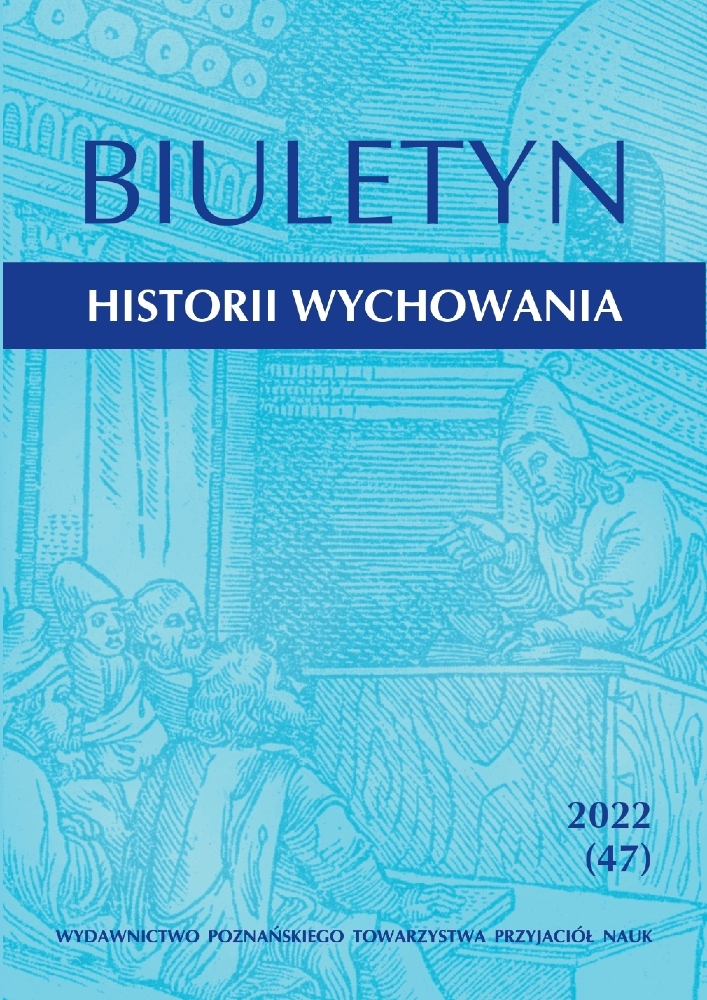Ze Wschowy do Strasburga przez Bazyleę – przypadki edukacyjne Jana Jakuba Doldego (1717–1789)
DOI:
https://doi.org/10.14746/bhw.2022.47.6Słowa kluczowe:
peregrination medica, Basel university, Strasbourg, Wschowa, Johann Jacob Dolde, Age of EnlightenmentAbstrakt
Johann Jacob Dolde (1717–1789) was a poor son of a barber from a small border town of Wschowa. From an early age, however, he longed to become a trained doctor of medicine. In order to achieve his goal, as an adolescent, he travelled abroad in order to receive proper education. His journey of several years took him through Poland, Royal Prussia, Ducal Prussia, Courland, Russia, Sweden, France, Switzerland, and finally ended in Alsace (Strasbourg), the land of his ancestors. Dolde described his memories of this journey in a short biography. The aim of this article, therefore, is to provide insight into the educational journey of Johann Jacob Dolde, and to show his determination during the numerous journeys. Indeed, he eventually fulfilled his dream and started a family in Strasbourg. His journey was part of the peregrination medica model and, as his memoirs are not known in Polish literature, is valuable historical
material.
Pobrania
Bibliografia
Bähr A., Condemning Oneself to Death. The Semantics of Suicide in Self-Narratives of the German Enlightenment, w: Mapping the ‘I’: Research on Self-Narratives in Germany and Switzerland, red. C. Ulbrich, K. v. Greyerz, L. Heiligensetzer, Leiden–Boston 2014, s. 166–189. DOI: https://doi.org/10.1163/9789004283978_009
Dulieu L., Jean Astruc, „Revue d’histoire des sciences” 1973, 26, nr 2, s. 113–135. DOI: https://doi.org/10.3406/rhs.1973.3316
Friebe M., Geschichte der ehemaligen Lateinschulen Fraustadts, Fraustadt 1894.
Hans N ., Russian Students at Leyden in the 18th Century, „The Slavonic and East European Review” 1957, 35, nr 85, s. 551–562.
Hirsch A ., Büttner, Christoph Gottl., w: Allgemeine Deutsche Biographie, t. 3, Leipzig 1876, s. 660 .
Husner F., Verzeichnis der Basler medizinischen Universitätsschriften von 1575–1829, Basel 1942.
Ottosson P-G., Johan Christopher Nordenheim, w: Svenskt biografiskt lexikon, t. 27, red. G. Nilzén, Stockholm 1990–1991, s. 240.
Paulsson T., Onaturlig födelse. Johan von Hoorn och det obstretiska dilemmat 1680–1730, Lund 2017.
Pękacka-Falkowska K., Inwentarze i kontrakty dzierżawne toruńskiej łaźni nowomiejskiej z pierwszej połowy XVIII wieku, „Kwartalnik Historii Kultury Materialnej” 2015, 63, nr 1, s. 119–140.
Pękacka-Falkowska K., Matthias Ernst Boretius z Mazur i jego promocja doktorska w Niderlandach: z badań nad historią nauczania medycyny w XVIII wieku, w: Wybrane problemy historii medycyny. W kręgu epistemologii i praktyki, red. A. Magowska, M. Owecki, K. Pękacka-Falkowska, Poznań 2020, s. 205–221.
Pękacka-Falkowska K., The Medical Faculty at the University of Leiden and its Graduates from the Polish-Lithuanian Commonwealth: Some Introductory Remarks, „Biuletyn Polskiej Misji Historycznej” 2020, 15, s. 97–138. DOI: https://doi.org/10.12775/BPMH.2020.004
Schober G., Quellen und Forschungen zur Heimatkunde des Frauenstädter Ländchens, Fraustadt 1936 .
Sitzmann F.E., Dictionnaire de biographie des hommes célèbres de l’Alsace depuis les temps les plus reculés jusqu’à nos jours, t. 1, Rixheim 1909.
Snorrason E., Anatomen J.B. Winsløw 1669–1760, Kobenhavn 1969.
Spiess O., Bernoulli, Daniel, w: Neue Deutsche Biographie, t. 2, Berlin 1955.
Stieda L., Schreiber, Johann Friedrich, w: Allgemeine Deutsche Biographie, t. 32, Leipzig 1891, s. 473–476.
Szyrocki M., Andrzej Gryphius. W trzechsetną rocznicę śmierci, „Śląski Kwartalnik Historyczny Sobótka” 1964, 19, nr 3–4, s. 365–381.
Wickersheimer E ., Souvenirs d’un médecin strasbourgeois du XVIIIe siècle, „La Revue d’Alsace” 1909, 58, s. 61–93.
Pobrania
Opublikowane
Jak cytować
Numer
Dział
Licencja
Prawa autorskie (c) 2024 Robert T. Tomczak

Utwór dostępny jest na licencji Creative Commons Uznanie autorstwa – Użycie niekomercyjne – Bez utworów zależnych 4.0 Międzynarodowe.
Zgodne z normami prawa polskiego.









